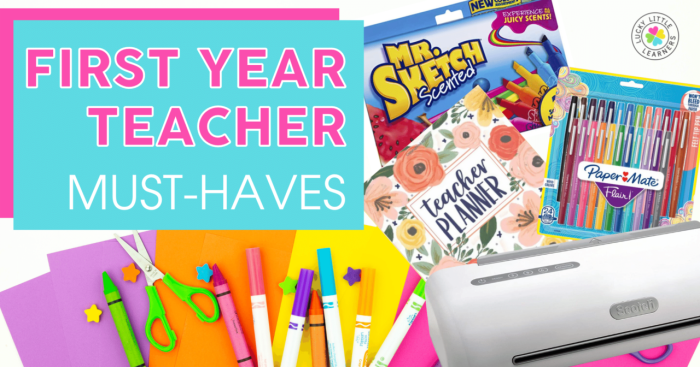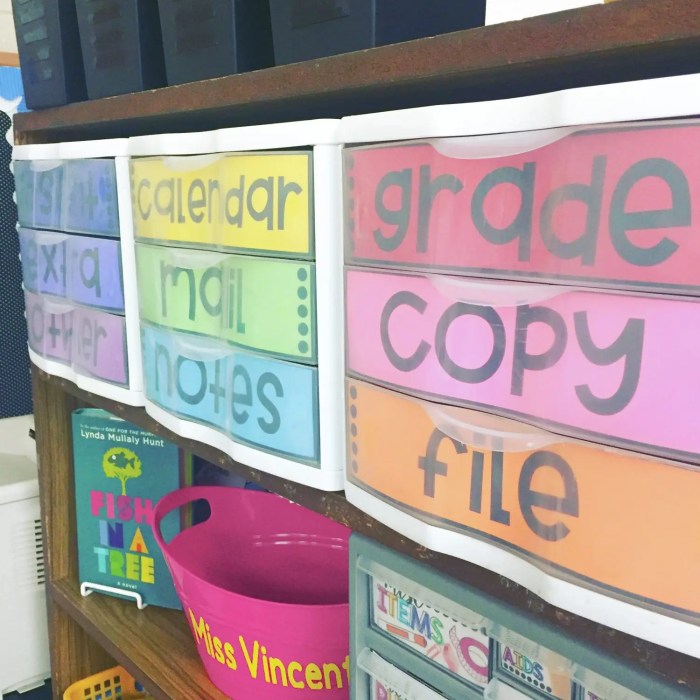Must haves for first year teachers – Stepping into the world of teaching as a first-year educator can be both exhilarating and daunting. Embarking on this journey requires a solid foundation of essential knowledge and strategies. This comprehensive guide provides a roadmap for first-year teachers, outlining the must-haves for a successful and fulfilling start to their teaching careers.
From establishing effective classroom management techniques to mastering lesson planning and assessment, this guide covers the core competencies necessary for first-year teachers to thrive. By embracing these must-haves, educators can create a positive and engaging learning environment, foster student growth, and navigate the challenges of their first year with confidence.
Classroom Management
Effective classroom management is crucial for creating a positive and productive learning environment. For first-year teachers, establishing clear expectations and routines is essential. This involves setting rules and procedures, communicating them clearly to students, and consistently enforcing them. Positive reinforcement and rewards can also be used to encourage desired behaviors.
Managing Student Behavior
- Address disruptive behaviors promptly and consistently.
- Use a variety of strategies to manage behaviors, such as positive reinforcement, time-outs, or parent-teacher communication.
- Create a classroom environment that promotes respect and empathy.
Fostering a Positive Learning Environment, Must haves for first year teachers
- Build relationships with students and create a supportive atmosphere.
- Encourage student participation and provide opportunities for them to share their ideas.
- Use humor and enthusiasm to make learning enjoyable.
Lesson Planning and Delivery

Effective lesson planning is essential for ensuring that lessons are engaging, meaningful, and meet the needs of all students. First-year teachers should focus on planning lessons that are well-organized, aligned with curriculum standards, and include a variety of activities to cater to different learning styles.
Essential Elements of Lesson Planning
- Clear learning objectives
- Engaging activities
- Differentiated instruction
- Assessment plan
Teaching Methods and Strategies
Different teaching methods and strategies are appropriate for different learning styles and content areas. First-year teachers should explore a variety of methods, such as direct instruction, inquiry-based learning, and cooperative learning.
Pacing Lessons and Differentiation
Pacing lessons effectively ensures that students have sufficient time to learn and practice new material. Differentiation involves modifying instruction to meet the diverse needs of students. First-year teachers should adjust the pace and difficulty of lessons based on student assessments and observations.
Assessment and Evaluation: Must Haves For First Year Teachers
Assessment is an integral part of the teaching process, providing teachers with valuable information about student learning. First-year teachers should use a variety of assessment methods to gather data on student progress and make informed decisions about instruction.
Types of Assessments
- Formative assessments: Monitor student progress during instruction
- Summative assessments: Evaluate student learning at the end of a unit or course
Creating Effective Assessments
- Align assessments with learning objectives
- Use a variety of assessment formats
- Provide clear instructions and grading rubrics
Communication and Collaboration
Effective communication is essential for building relationships with students, parents, and colleagues. First-year teachers should prioritize communication and seek opportunities to collaborate with others.
Building Relationships
- Establish open and respectful communication channels with students
- Maintain regular communication with parents to keep them informed about their child’s progress
- Collaborate with colleagues to share ideas and support each other
Using Technology for Communication
- Use email, messaging apps, or online platforms to communicate with students and parents
- Create a class website or blog to share updates and resources
- Use video conferencing tools for virtual meetings or parent-teacher conferences
Professional Development
Continuous professional development is essential for first-year teachers to enhance their skills and knowledge. Seeking out opportunities for growth and support is crucial for their success.
Importance of Professional Development
- Stay updated on best practices and educational research
- Improve teaching skills and content knowledge
- Enhance student learning outcomes
Resources for Professional Development
- Workshops and conferences
- Online courses and webinars
- Mentoring and peer support
Technology Integration

Integrating technology into the classroom can enhance teaching and learning. First-year teachers should explore ways to use technology to engage students, provide differentiated instruction, and promote collaboration.
Benefits of Technology Integration
- Enhanced student engagement and motivation
- Differentiated learning experiences
- Increased access to resources and information
Effective Use of Technology
- Use technology to support learning objectives
- Incorporate technology into lesson plans and activities
- Provide students with opportunities to explore and use technology
Self-Care and Well-being
Maintaining self-care and well-being is essential for first-year teachers to manage stress and thrive in their profession. Prioritizing their physical, emotional, and mental health is crucial.
Importance of Self-Care
- Reduces stress and burnout
- Improves physical and mental health
- Enhances job satisfaction
Tips for Self-Care
- Establish a healthy work-life balance
- Engage in regular exercise and healthy eating
- Seek support from colleagues, friends, or family
Common Queries
What are the most important qualities of a successful first-year teacher?
Enthusiasm, adaptability, effective communication skills, strong classroom management abilities, and a commitment to student learning are crucial qualities for first-year teachers.
How can first-year teachers effectively manage their classrooms?
Establishing clear expectations, routines, and consequences, fostering positive relationships with students, and utilizing effective classroom management strategies are essential for maintaining a productive and respectful learning environment.
What are the key elements of effective lesson planning?
Identifying learning objectives, selecting appropriate teaching methods, incorporating differentiation, and ensuring student engagement are crucial elements of effective lesson planning.
How can first-year teachers effectively assess student learning?
Utilizing a variety of assessment methods, providing timely and meaningful feedback, and involving students in the assessment process are key strategies for effective assessment.

